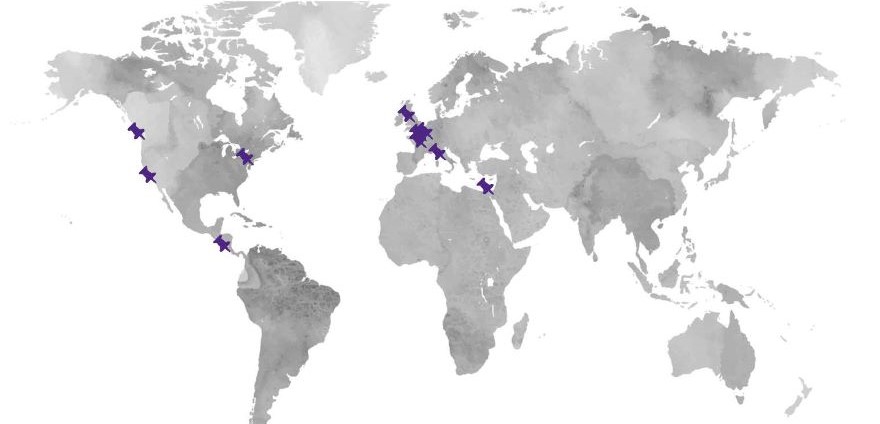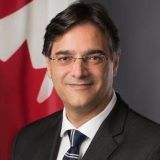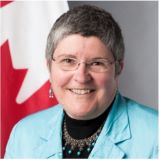Contact Us
Western Academy for Advanced ResearchWestern Interdisciplinary Research Building
Western University
London, Ontario
N6A 3K7
wafar@uwo.ca
Visiting Fellows


The Western Academy facilitates collaborations with internationally recognized and emerging scholars, thinkers and leaders. Drawn from different communities and nationalities across Canada and the world, Western Academy Visiting Fellows enrich research themes by introducing new perspectives and ways of thinking about humanity's greatest challenges.
Current and Upcoming Visiting Fellows

Uzma Rashid
University for Peace (San José, Costa Rica)
Theme 6: Exploring Possibilities for Peace in the Twenty-first Century
July 2025
Dr. Uzma Rashid currently serves as Associate Professor, Department of Peace and Conflict Studies at the United Nations Mandated University for Peace, Costa Rica, in particular managing the Gender and Peacebuilding, and Religion, Culture, and Peace Studies Masters programs. Prior to joining UPeace, she worked as Chair at the Department of Sociology, and Associate Dean for Research of the School of Social Sciences and Humanities at the University of Management and Technology, Lahore, Pakistan.
Dr. Rashid has done her PhD as a Fulbright scholar from the interdisciplinary Language, Literacy, and Culture program at the University of Maryland, Baltimore County, USA, and has extensive teaching and research experience in a variety of contexts. Her current research interests lie at the intersections of gender, sexuality, religion, race, ethnicity, disability, and socioeconomic status, in particular focusing on intersectionality and inclusivity in peacebuilding efforts.
Source: https://www.kaiciid.org/
— — — —

John T. Holmes
Ambassador (ret.), Global Affairs Canada (Ottawa)
Theme 6: Exploring Possibilities for Peace in the Twenty-first Century
Fall 2025
John T. Holmes brings years of experience working with war-affected countries. Throughout his career as a diplomat, Holmes served as Canada's Ambassador to nine countries, including Iraq, Timor Leste, Philippines, Georgia, and Azerbaijan. Holmes has held many leadership positions, where he participated in decision-making on issues relating to interstate conflict, international courts, and peacebuilding. Holmes served as Canada's Legal Advisor on the United Nations Security Council and the International Court, and chaired negotiations on the Agenda for War-Affected Children (2000).
— — — —

Masud Husain
Ambassador (ret.), Global Affairs Canada (Ottawa)
Theme 6: Exploring Possibilities for Peace in the Twenty-first Century
Fall 2025
Masud Husain served as Canada's Ambassador to the United Arab Emirates and as Special Envoy to the Organization of Islamic Co-operation. A recognized expert in peace and conflict in the Middle East, Husain has held many leadership roles at Global Affairs Canada, include the role of Director General and Deputy Legal Advisor. Husain has extensive knowledge and experience in issues relating to geographical and environmental disputes, transnational organized crime, and peace and security..
— — — —

Sabine Nölke
Ambassador (ret.), Global Affairs Canada (Ottawa)
Theme 6: Exploring Possibilities for Peace in the Twenty-first Century
Fall 2025
Sabine Nölke has had over 30 years of experience as a leading voice in matters of international peace and security, armed conflict, non-proliferation and disarmament, human rights, terrorism, and international and transnational crime.
She has provided legal and policy advice to the Government of Canada on issues ranging from international humanitarian law, to reparations, to genocide, and the threat and use of weapons of mass destruction, including serving as co-counsel for Canada before the International Court of Justice, on Legality of the Use of Force (Serbia v. Canada et al.). She has served as Director of the United Nations, Human Rights, and Economic Law division (2007) and as Canada's Ambassador to the Netherlands (2015-2019).
— — — —
Past Visiting Fellows
Jalel Ben Othman, Université Sorbonne Paris Nord, Villetaneuse, France
Theme 4: Interdisciplinary Research to Address Technical and Social Barriers in Smart Cities and Communities | June, November 2024
Katharine Willis, University of Plymouth, Plymouth, UK
Theme 4: Interdisciplinary Research to Address Technical and Social Barriers in Smart Cities and Communities | January, July—August 2024
Mojtaba Jarrahi, Université Paris-Saclay, Orsay, France
Theme 3: Nature-inspired Solutions for Carbon Transformation | May, July—August 2024
Paola Giudicianni, Italian National Research Council, Naples, Italy
Theme 3: Nature-inspired Solutions for Carbon Transformation | September—November 2023, March—April 2024, July—August 2024
Lucy Jones, Seismologist; Founder, Dr. Lucy Jones Center for Science and Society, Pasadena, CA, USA
Theme 2: Climate Resilient Infrastructure and Buildings | January, May, November 2023; March 2024
Becky Denlinger, Deputy Minister (ret.), Emergency Management, Ministry of Public Safety, Province of British Columbia, Victoria, BC
Theme 2: Climate Resilient Infrastructure and Buildings | January, May, November 2023
Christian Maire, Franche-Comté Electronics Mechanics Thermal Science and Optics – Sciences and Technologies (FEMTO-ST), Besançon, France
Theme 1: Mathematics of Neural Networks | June—August 2023
Frédéric Chavane, Centre National de la Recherche Scientifique (CNRS), Marseille, France
Theme 1: Mathematics of Neural Networks | April 2023
Alex Lubotzky, Hebrew University, Weismann Institute of Science, Rehovot, Israel
Theme 1: Mathematics of Neural Networks | April 2023
Maria Chudnovsky, Princeton University, Princeton, USA
Theme 1: Mathematics of Neural Networks | February 2023

